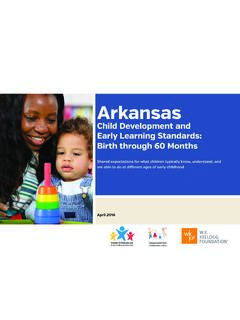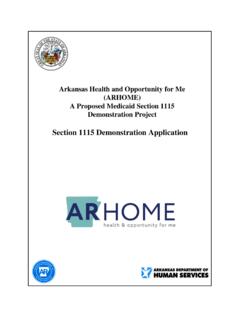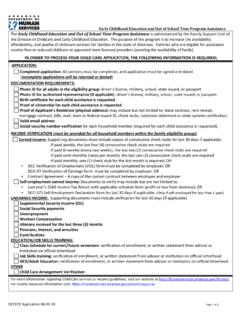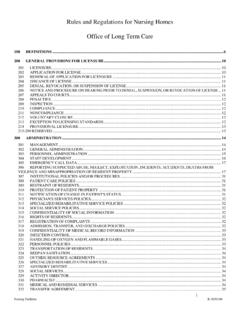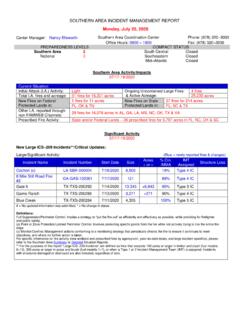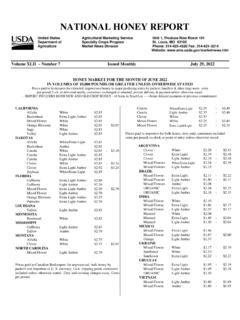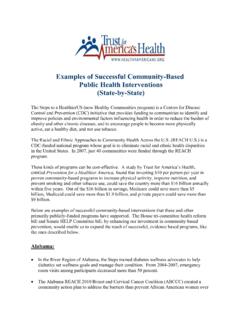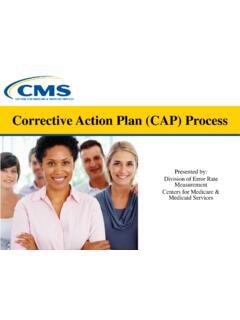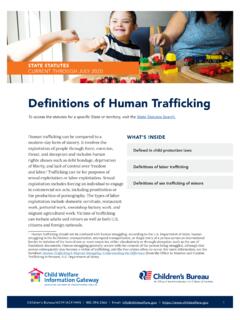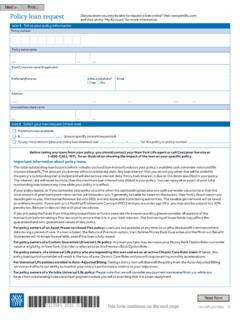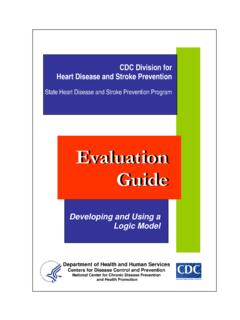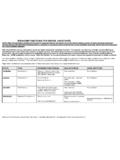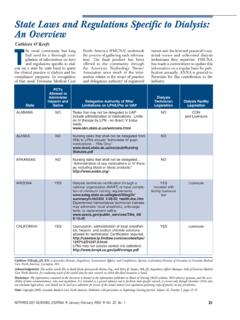Transcription of Arkansas Department of Health Arkansas Department of …
1 1 Arkansas Department of Health Arkansas Department of Human Services To: Child Care Facilities From: Dr. Jos Romero, Secretary of Health Cindy Gillespie, Secretary of Human Services Date: Updated February 1, 2022 Subject: COVID-19 Guidance for Child Care Facilities Early childhood education programs are an important part of the infrastructure of communities. They provide safe and supportive care environments for children that support social and emotional development, provide access to critical services, and enable parents, guardians, and caregivers to work. Children can be infected with the SARS-CoV-2 Virus that causes COVID-19, can get sick with COVID-19, and can spread the virus to others. Most early childhood education programs serve children under 12 years of age, with those under the age of 5 not eligible for vaccination at this time. The Arkansas Department of Health (ADH) and the Arkansas Department of Human Services (DHS) is providing interim guidance to the regulated childcare facilities throughout the state on implementing layered COVID-19 prevention strategies to protect people who are not fully vaccinated, including infants and children, staff, and other members of their households.
2 Guidelines will be revised when CDC releases new guidance for these early childhood education programs. It is recommended facilities should prohibit persons from the facility with the exception of: o Facility staff. o Persons with legal authority to enter, including law enforcement officers, childcare licensing staff, and DHS Child Protective Services staff. o Professionals providing services to children. o Children enrolled at the facility. o Parents or legal guardians who have children enrolled and present at the facility. Do not allow sick people in the facility. Children and staff who have symptoms of infectious illness should stay home and be referred to their Health care provider for testing and care. If a child or staff person becomes sick while at the facility, separate them from other children and staff. For children, immediately contact the parent or legal guardian. All efforts should be made to limit the number of children in each group/class to the extent possible and keep children in the same assigned group/class each day.
3 Maximize physical distance as much as possible when eating. Reinforce handwashing with soap and water for at least 20 seconds and covering coughs and sneezes to keep from getting and spreading infectious illnesses including COVID-19. 2 Universal indoor masking is recommended for all teachers, staff, students, and visitors, regardless of vaccination status. For safety reasons, under no circumstances should a mask be placed on a child under the age of 2. Encourage staff and family members that have frequent contact with children in the early childhood education setting to get vaccinated, including boosters if/when eligible. Who does not need to quarantine? Anyone who comes into close contact with someone with COVID-19 and is in one of the following groups does not need to quarantine, as long as they have no symptoms: Anyone ages 18 or older who has received all recommended vaccine doses, including boosters and additional primary shots for some immunocompromised people (people are eligible for a booster dose 5 months after completing the 2nd dose of Pfizer or Moderna, or 2 months after completing a single dose of Johnson & Johnson).
4 Anyone ages 5-17 years who completed the primary series of COVID-19 vaccines. Anyone who has had confirmed COVID-19 within the last 90 days (confirmed positive using a PCR or antigen test) and remains symptom-free. Who should quarantine? Anyone who comes into close contact with someone with COVID-19 should stay home and quarantine if they are in one of the following groups: Anyone ages 18 or older who completed the primary series of recommended vaccine but has not received a recommended booster shot when eligible. (people are eligible for a booster dose 5 months after completing the 2nd dose of Pfizer or Moderna, or 2 months after completing a single dose of Johnson & Johnson). Anyone ages 5-17 who has not completed a primary vaccine series. Anyone who is not vaccinated or has not completed a primary vaccine series. Length of Quarantine: People who are not up to date with COVID-19 vaccines (received all recommend doses, including any booster dose(s) when eligible) or did not have confirmed COVID-19 within the last 90 days should stay home and quarantine for at least 5 full days from last close contact with the person with COVID-19 and stay away from other people as much as possible.
5 People without symptoms can end quarantine after 5 full days and return to the ECE program if they are older than age 2 and able to consistently and correctly wear a mask while in the ECE program. For children and staff who are unable to consistently wear a mask when around others (including all children under 2 years of age) the safest option is to continue to quarantine for a full 10 days. Exposed individuals, regardless of vaccination status or previous COVID infection, should monitor for any symptoms and wear a well-fitting mask around others for at least 10 days from the date of their last 3 close contact with someone with COVID-19 (the date of last close contact is considered day 0). It is recommended they get tested at least 5 days after they last had close contact with someone with COVID-19. Any exposed individual that tests positive or develops COVID-19 symptoms needs to isolate from other people and follow recommendations for isolation.
6 Who should isolate? Anyone who is confirmed to have COVID-19 or is showing symptoms of COVID-19 needs to isolate regardless of their vaccination status. This includes: Anyone who has a positive PCR or antigen viral test for COVID-19, regardless of whether they havesymptoms. Anyone with symptoms of COVID-19, including people who are awaiting test results or have notbeen tested. People with symptoms should isolate even if they do not know if they have been inclose contact with someone with of Isolation: Staff and children who have presumed or confirmed COVID-19 should stay home and isolate for at least 5 full days and stay away from other people. People without symptoms can end isolation after 5 full days and return to the ECE program ifthey are older than age 2 and able to consistently and correctly wear a mask while in the ECEprogram. People who previously had symptoms can end isolation after 5 full days and return to the ECEprogram if they are fever-free for 24 hours without the use of fever-reducing medication and ifsymptoms have improved (loss of taste and smell may persist for weeks or months afterrecovery and need not delay the end of isolation) as long as they are able to consistently andcorrectly wear a mask while in the ECE program.
7 For children and staff who are unable to consistently wear a mask when around others(including all children under 2 years of age) the safest option is to continue to isolate for a full10 should continue to wear a well-fitting mask around others at home and in public for 5 additional days (day 6 through day 10) after the end of their 5-day isolation period. If fever or other symptoms have not improved after 5 days, isolation should continue until they are fever-free for 24 hours without the use of fever-reducing medications and other symptoms have improved. If symptoms develop after testing positive, the 5-day isolation period starts over with day 0 being the first day of symptoms. ADH and DHS will continue to closely monitor the evolving COVID-19 outbreak. Childcare providers are encouraged to call the Department of Human Services Division of Child Care & Early Childhood Education, Child Care Licensing at 501-320-6071 for answers to child care related COVID questions.
8 4 COVID-19 Information: General Protection Guidelines: Environmental Cleaning and Disinfection Recommendations.


